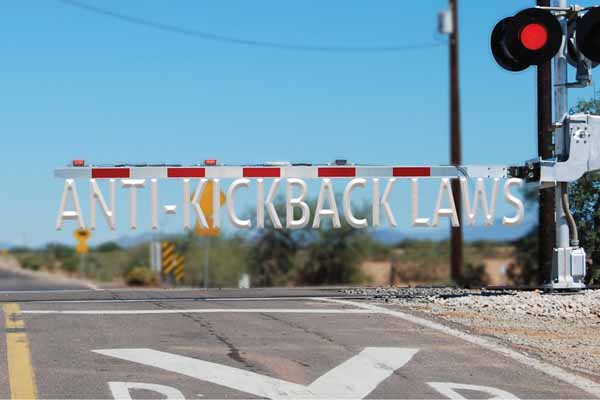
Federal anti-kickback law has changed, and it’s gotten broader.
As a result, you may need to re-examine your practice’s compensation arrangements. That includes payments for laboratory referrals.
If your practice refers patients covered by commercial insurance to a laboratory you own, for example, the Eliminating Kickbacks in Recovery Act of 2018 (EKRA) may affect you. Unlike the more well-known existing federal anti-kickback statutes, which apply only to federal health care programs like Medicare or Medicaid, EKRA applies to any health benefit program and any physician practice.
That makes physician practices that refer patients to their own laboratories more vulnerable to running afoul of the law, if they compensate physicians differently based on referrals.
“Any doctor’s goal is to refer a patient to a specialist or a laboratory that will do the best job for the patient. And obviously if you have a financial incentive, it can sometimes muddy the water significantly and probably should be avoided,” said Texas Medical Association Past President Bruce Malone, MD, a retired orthopedic surgeon. He is now a consultant for Texas Mutual Insurance Co. But EKRA, he says, contains a danger involving referral to a practice’s own laboratory that didn’t exist before.
Since President Donald Trump signed EKRA into law last year, physicians and others have been waiting for the federal government to provide further guidance. In the meantime, it’s already on the books, and experts say physician practices must be careful with their referral compensation arrangements and may need to adjust them.
Not just federal programs
Physicians are likely already familiar with existing federal anti-referral laws. The Anti-Kickback Statute prohibits paying or otherwise compensating for referrals for services payable by federal health care programs, and it prohibits offering or receiving such compensation; the Physician Self-Referral Law, also known as the Stark Law, bars physicians from referring Medicare or Medicaid patients for certain health services to a facility with which the physician has a financial relationship.
But EKRA applies broadly to any health care plan or contract – government or commercial.
Signed into law on Oct. 24, 2018, EKRA creates criminal penalties for any person who solicits or receives “any remuneration” in exchange “for referring a patient or patronage to a recovery home, clinical treatment facility, or laboratory.” It also prohibits any compensation to induce a referral to those types of facilities. That includes “any kickback, bribe, or rebate,” the law specifically states. EKRA does not replace the other federal laws; they’re still on the books, and TMA’s legal team warns it’s possible to violate both those laws and EKRA.
In an explainer article for Physicians Practice (tma.tips/EKRAarticle), attorney Peter Domas of the Dickinson Wright firm writes that EKRA is “potentially applicable to almost all physician practices and clinical laboratories.” He also notes that the law does have a number of exceptions, just as the Anti-Kickback Statute does, such as properly disclosed discounts physicians may obtain under a health plan program.
But EKRA differs from the Anti-Kickback Statute in some key ways, Mr. Domas writes. While the older law has an exception for payments employers pay to “bona fide” employees, EKRA does not. Instead, “EKRA only exempts compensation when the employee’s and independent contractor’s reimbursement does not vary by the number of individuals referred, the number of tests or procedures [performed], or the amount billed or received,” he wrote.
“The only thing that you can do to be sure 100% that you don’t run afoul of [EKRA] is to revise your distribution methodology so that it doesn’t take into account the number of tests you order,” Houston health care attorney Donna Clark told Texas Medicine. “In other words, to expand your methodology for distributing laboratory revenue generated from Medicare patients to all of your patients.”
Needing more clarity
One physician who is interested to see further guidance is Wichita Falls pathologist Susan Strate, MD. Saying the law “puts us in an interesting situation,” Dr. Strate believes laboratories still have questions about what kinds of compensation EKRA prohibits. Specifically, she wonders whether labs could face criminal penalties “for things like donating free testing and supplies that could be considered paying or offering remuneration, or providing a phlebotomist to a physician’s office to draw blood specimens that are being sent to a lab.”
“There are a lot of gray areas and no one really knows,” Dr. Strate said. “Nobody has really come down and made this black and white. That’s the whole gist of the problem.”
Maximum criminal penalties for violating EKRA include a $200,000 fine, 10 years in prison, or both. Ms. Clark says she’s not aware of any enforcement action that’s taken place thus far, but “the government’s position is that once it becomes effective, it’s effective.”
She anticipates the U.S. Department of Justice (DOJ) will eventually release further guidance on the law, but it’s unclear when that will happen.
DOJ did not respond to an inquiry from Texas Medicine.
TMA’s general counsel’s office says physicians should consult their own attorneys for advice as they review their referral policies and compensation arrangements.
Tex Med. 2019;115(10):40-41
October 2019
Texas Medicine Contents Texas Medicine Main Page